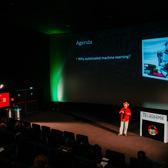Developing Distributed Applications with Azure and .NET Aspire
UASPI
2 days
Interested in a private company training? Request it here.
Not ready to book yet? Request an offer here.
Introduction to Distributed Applications
As your application matures, you might encounter some growing pains, this is a good sign you might want to step away from a monolithic approach. Distributed applications leverage the power of multiple computing resources to provide a more robust, scalable, and efficient system.
- Application Architecture Throughout the Years
- Containers: The Gateway to Distributed Applications
- Docker Basics
- Strengths and Challenges in Modern Application Architecture
- .NET Aspire to the Rescue
.NET Aspire Overview
.NET Aspire is designed to simplify the development of distributed, observable, and production-ready applications using .NET. It provides a set of tools, libraries, and templates that streamline the process of building applications, particularly those that are cloud-native, meaning they are optimized to run in cloud environments.
- The Pillars of .NET Aspire
- Orchestration in C# with AppHost
- Aspire Dashboard: Get the Best Developer Experience you can, for Free!
- Observability, Resiliency and Health Checks using Service Defaults
- .NET Aspire Deployment Options
- LAB: Getting to Know .NET Aspire
Building Distributed Applications with .NET Aspire
So you've decided to build a distributed application, how do you get started and what will you need? In this module we take a look at some of the key building blocks of a distributed application such as APIs, client applications and data sources.
- Basic Building Blocks of a Distributed Application
- Tying the Building Blocks of your Application together
- Connecting Your Projects to each other with Service Discovery
- Should your Development Environment really try to mimic your Production Environment?
- LAB: Building a Distributed Application with .NET Aspire
Enhancing your Application with Pluggable Integrations
Now that you know how .NET Aspire can tie the parts of your application together, why not add some useful resources like a cache, a database, or basically any container you want?
- What are .NET Aspire Integrations?
- Commonly Used Integrations: Caching, Messaging, Storage,...
- Hosting and Consuming Integrations
- Configuring Integrations
- LAB: Adding existing Integrations to your Application
Asynchronous Communication
In this module, you will learn what event-based communication is and why it's such a great fit for microservices.
- Communication Patterns
- Event-Based Communication
- Event Bus
- Integration Events
- Eventual Consistency
Building Microservices with Dapr
Where do you run your containers? How do you store data? Which message broker will you use? The list of decisions you have to make goes on. But how do you shield your code against all those technical details? Dapr is a distributed application runtime that keeps your code platform-agnostic. This is done through an architecture of pluggable components. Swap out your database without even recompiling the code!
- Dapr Overview
- Installation
- State Management
- Service Invocation
- Publish and Subscribe
- Bindings
- Observability
- Secrets Management
- LAB: Using Dapr with .NET Aspire
Azure for Container Overview
Azure has many constructs that have to do with containers and microservices. It's a bit overwhelming, really. This module will help you separate the sheep from the goats, to figure out exactly what you need.
- Azure Container Registry
- Hosting Containers: Container Instances, AKS, Service Fabric, ACA
- Deploy with Containers: Web Apps and Functions
Azure Container Apps
Managing scalable containers on a Kubernetes cluster in Azure, but without the complexity. Sounds like a dream? It's not, this is exactly what Azure Container Apps are all about. In this module you will learn how to set up a serverless container solution using event-driven scaling.
- Container Apps and Environments
- Event-based Scaling with KEDA
- Working with Revisions
- Integrating with Dapr Components
- Network and Ingress
- Authentication and Service Connection
Deploying .NET Aspire Applications
We know Azure Container apps is the preferred deployment environment for .NET Aspire, but wouldn't it be great if we could deploy our app anywhere we want? and what about CI and CD? In this module we'll explore all our options.
- Aspire Manifest
- Deploying to Azure Container Apps
- Deploying to AKS using Aspir8
- Continuous Integration & Deployment
- LAB: Deploying to Azure Container Apps
Dive into the future of scalable software design with our course on Distributed Applications using Azure and .NET Aspire. This course is designed for developers looking to master the art of building robust, high-performance distributed systems. Use .NET Aspire to design, implement, and manage applications that are resilient, scalable, and ready to meet the demands of modern business environments. You will learn best practices for inter-service communication, and utilize cloud-native technologies to deploy and manage your distributed applications. Whether you're working on real-time data processing, complex web services, or scalable cloud solutions, this course gives you the skills you need.
This course is for experienced .NET developers who want to learn .NET Aspire for streamlined local development and deployment of distributed applications on Azure.









